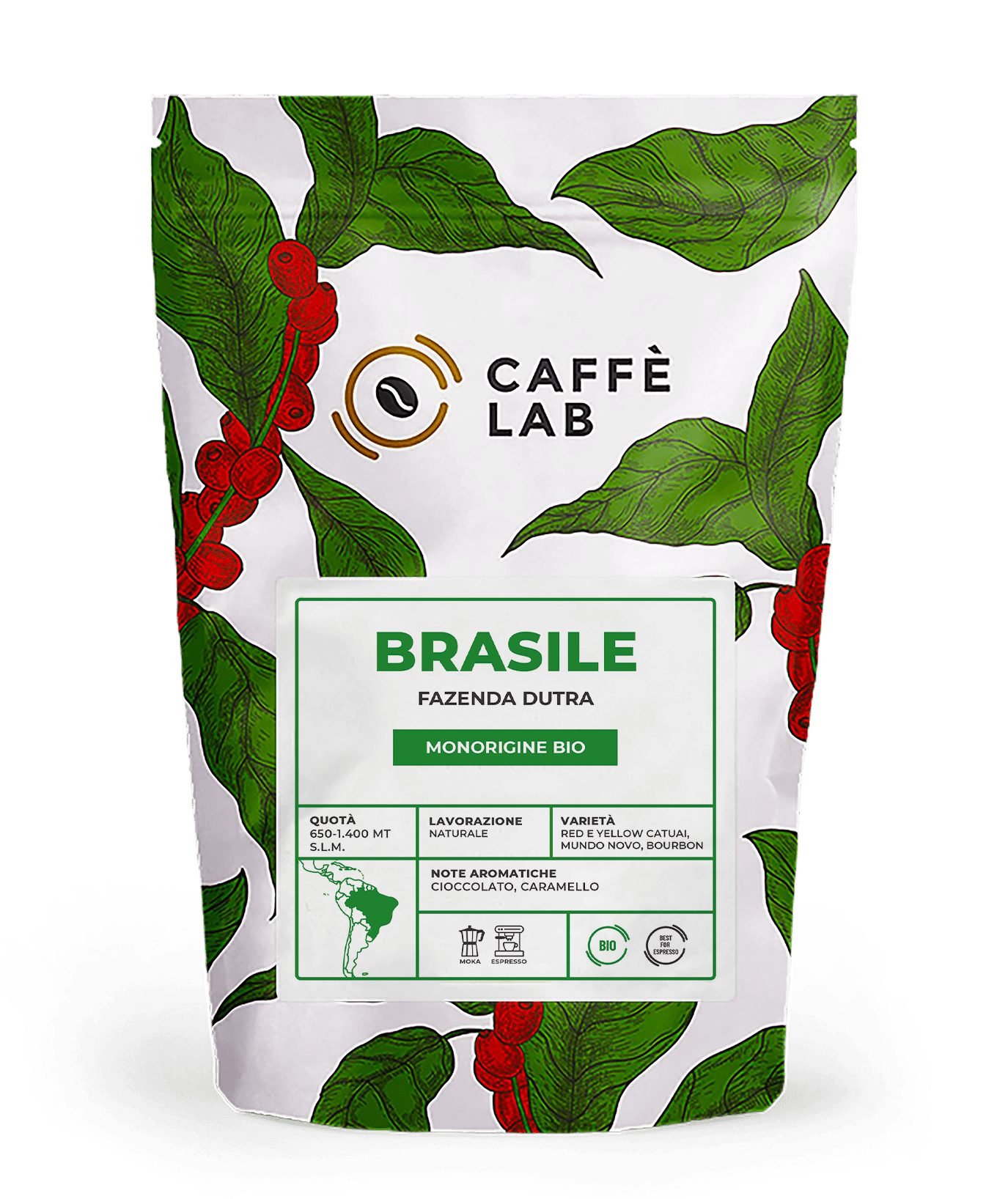
Brazil Organic
Fazenda Dutra


Coffee, one of the world’s most beloved and widely consumed beverages, boasts a history that spans millennia and embraces diverse cultures and traditions. From its early discovery in Ethiopia as a stimulating and energising drink, to its explosion in popularity in 17th-century European coffee houses, coffee has captured the hearts—and palates—of millions. Today, it is no longer just a daily pleasure or a simple pick-me-up: it’s recognised as a genuine contributor to human health. Recent scientific research has revealed that your daily brew may hold surprising benefits well beyond its immediate mood-lifting effects. From boosting brain function to reducing the risk of chronic illness, coffee is gaining recognition as a key element in a balanced lifestyle. High-quality blends of coffee, rich in antioxidants and bioactive compounds, offer far more than just sensory enjoyment. That small cup holds nutritional treasures which, when consumed in moderation, can significantly support overall wellbeing.
The relationship between coffee and health has long been debated, but modern research paints an increasingly positive picture. At the heart of this relationship lies caffeine—naturally present in coffee beans and largely responsible for many of coffee’s positive effects. Contrary to past concerns, moderate coffee consumption—usually defined as 3 to 4 cups per day—is now associated with a range of health benefits.
Caffeine acts as a central nervous system stimulant, improving alertness, attention and short-term cognitive function. But it would be reductive to credit caffeine alone. Coffee contains more than 1,000 bioactive compounds, many of which are powerful antioxidants, including chlorogenic acids. These compounds, which vary depending on the bean origin, help combat oxidative stress and inflammation—two underlying causes of many chronic diseases.
Coffee also has an impressive impact on metabolism. Caffeine is known to boost basal metabolic rate and fat oxidation, aiding weight control. Furthermore, epidemiological studies show habitual coffee drinkers have a lower risk of developing type 2 diabetes, likely due to improved insulin sensitivity.
Surprisingly, coffee may also be good for your heart. Once thought to be harmful, current evidence suggests that moderate coffee consumption may actually protect against cardiovascular conditions. Antioxidants in coffee help maintain vascular health by reducing inflammation and improving endothelial function.
Perhaps most remarkably, coffee may support longevity. Several large-scale observational studies have found that regular coffee drinkers tend to live longer, with lower all-cause mortality rates. It’s a compelling reason to view your coffee break as more than just a daily habit—it may be a daily dose of life extension.
That said, effects can vary by individual. Genetics, lifestyle, and pre-existing conditions play a role. Some people are more sensitive to caffeine and may experience anxiety, insomnia or increased blood pressure. As with any functional food, personalisation and moderation are key.

Coffee is not just a morning ritual, but a true ally for our brain. Caffeine, by blocking the adenosine receptor, enhances neuronal transmission and improves several aspects of brain function. Regular coffee drinkers experience increased mental clarity, faster reaction times and longer-lasting concentration. Particularly interesting is its effect on memory consolidation: studies conducted at the University of California have shown that drinking coffee after a study session can improve the retention of learned information. This benefit is especially valuable in an age where cognitive demands are constantly increasing.
One of the most promising benefits of coffee concerns long-term brain protection. Numerous epidemiological studies have shown that regular consumers have a significantly lower risk of developing neurodegenerative diseases such as Alzheimer’s and Parkinson’s. The bioactive compounds in coffee appear to protect neurons by counteracting the build-up of abnormal proteins and reducing neurological inflammation. A systematic review published in the Journal of Alzheimer’s Disease found that people who regularly drink coffee have up to 65% less risk of developing senile dementia compared to those who completely abstain. These protective effects are particularly significant when consumption is consistent over the years and begins in middle age.
Athletes know this well: a cup of coffee before training can make a real difference. Caffeine is one of the most studied and effective ergogenics, capable of improving endurance and muscle strength. The mechanism is multifactorial: on one hand, it increases adrenaline release; on the other, it mobilises fatty acids from adipose tissue, making them available as an energy source. Furthermore, caffeine reduces the perception of fatigue through its effects on the central nervous system. Studies conducted on endurance athletes have shown performance improvements of up to 12% after coffee consumption. Strength-based sports also benefit from this effect, with measurable increases in maximum strength of up to 7%.
Coffee’s contribution to the prevention of diabetes represents one of the most significant discoveries in modern nutrition. By analysing data from over 1.1 million participants in prospective studies, researchers found that each cup of coffee consumed daily is associated with a 7% reduction in the risk of developing type 2 diabetes. This protective effect is due to the ability of chlorogenic acids to improve insulin sensitivity and regulate glucose metabolism. Additionally, coffee stimulates the expression of glucose transporter proteins and the function of pancreatic beta cells. It’s not necessary to consume large quantities to benefit: even 2–3 cups per day offer significant protection.
The liver, the body’s primary detox organ, finds a valuable ally in coffee. Studies conducted around the world have shown that regular coffee consumers have a lower risk of developing liver fibrosis, cirrhosis, and hepatocellular carcinoma. The bioactive compounds in coffee appear to inhibit inflammatory processes in the liver and promote hepatocyte regeneration. Particularly significant is the protective effect against non-alcoholic fatty liver disease (NAFLD), a condition rapidly increasing in Western societies. A meta-analysis published in Gastroenterology revealed that coffee consumption is inversely correlated with advanced liver fibrosis, with up to 70% risk reduction in the most frequent drinkers.
Contrary to what was believed for decades, coffee does not harm the heart—it might actually protect it. Large-scale epidemiological studies have shown an inverse correlation between moderate coffee consumption and the risk of heart attack, stroke, and heart failure. Among coffee’s properties, the antioxidants present improve endothelial function, increase the bioavailability of nitric oxide and promote vasodilation. Additionally, coffee polyphenols reduce the oxidation of LDL cholesterol, one of the early steps in the formation of atherosclerotic plaque. The Framingham Heart Study, one of the most important epidemiological studies on cardiovascular risk, found that people who drank 3–5 cups of coffee per day had a 40% lower risk of heart failure than non-drinkers.
Perhaps the most surprising of coffee’s benefits concerns overall longevity. Several large-scale population analyses have shown a reduction in all-cause mortality among habitual coffee drinkers. A study published in The New England Journal of Medicine, which followed over 400,000 people for 13 years, found that men who drank 2–3 cups of coffee per day had a 10% lower risk of death compared to non-drinkers, while in women this reduction reached 13%. This positive association was also confirmed for decaffeinated coffee, suggesting that the benefits are due not only to caffeine but also to the other bioactive compounds present in the drink.

Coffee’s antioxidant power is one of its most significant health aspects. A single espresso contains more antioxidants than are found in many fruits and vegetables. Phenolic acids, particularly chlorogenic acid, neutralise free radicals and reduce cellular oxidative stress. This antioxidant action results in a systemic anti-inflammatory effect, confirmed by studies that have measured a reduction in inflammatory markers in the blood of regular coffee consumers. Chronic inflammation underlies numerous age-related conditions, from cognitive decline to arthritis and cardiovascular disease. By drinking coffee, we help keep this potentially harmful process under control.
Coffee is a valuable ally for those aiming to maintain a healthy weight. Among coffee’s benefits, caffeine boosts the basal metabolic rate by 3–11%, promoting greater energy expenditure even at rest. It also stimulates thermogenesis and enhances fat oxidation during physical activity. These metabolic effects are particularly evident in people who are not used to drinking coffee, but they still persist—albeit to a lesser degree—in regular drinkers. It’s worth noting that coffee alone is not a magical solution for weight loss, but when integrated into an active lifestyle and a balanced diet, it can significantly contribute to long-term healthy weight maintenance.
Coffee’s benefits also extend to skin health. When applied topically, coffee extract stimulates microcirculation and promotes fluid drainage, making it effective in the treatment of cellulite. Coffee polyphenols protect the skin from UV damage, reducing the risk of photoageing and potentially even skin cancers. Several studies have shown that regular coffee consumption is associated with a reduced incidence of basal cell carcinoma, the most common type of skin cancer. The protective effect appears to be dose-dependent, with greater benefits for those who drink 3 or more cups a day.
In light of the extensive scientific evidence that has emerged in recent years, coffee deserves to be reconsidered as a true ally for daily wellness. The wealth of bioactive compounds in this age-old beverage makes it a genuine functional food, capable of positively influencing various aspects of our physiology.
Particularly interesting is coffee’s impact on the gut microbiome, an emerging field of research that is uncovering unexpected connections with overall health. Coffee polyphenols seem to promote the proliferation of beneficial bacteria such as Bifidobacterium and Lactobacillus, thereby contributing to intestinal flora balance. This positive modulation of the microbiome may partly explain coffee’s systemic health effects—from reducing inflammation to improving glucose metabolism.
It’s also worth emphasising that coffee is an important source of essential micronutrients, often overlooked in nutritional assessments of this beverage. A cup of coffee provides significant amounts of magnesium, potassium and niacin (vitamin B3), contributing to daily nutritional needs. Magnesium in particular is involved in over 300 enzymatic reactions in the body and plays a key role in muscle and nerve function.
The social aspect of coffee deserves equal consideration when evaluating its overall health benefits. For centuries, the cup of coffee has represented a moment of pause, sharing and sociability in many cultures. This daily ritual not only provides a break from stress, but also supports interpersonal relationships and psychological wellbeing. Numerous epidemiological studies have shown that people with active social lives have a lower risk of developing depression and cognitive decline, suggesting that this cultural aspect of coffee also contributes to its positive effects on mental health.
To maximise coffee’s benefits, it is important to consider not only quantity but also quality and preparation method. High-quality coffee beans, preferably organic and traditionally roasted, better preserve the profile of bioactive compounds. The preparation method significantly affects the antioxidant content: methods such as espresso and moka, which use high temperatures and short extraction times, appear to optimally extract beneficial polyphenols. Conversely, adding large amounts of sugar or cream can negate some of the coffee’s metabolic benefits.
Ideally, coffee should be organic and free from chemical treatments, making it a valuable component of a balanced lifestyle, capable of offering benefits far beyond sensory pleasure and immediate stimulation. Scientific research continues to uncover new properties of this ancient drink, confirming that the traditional wisdom that made coffee a cornerstone of many cultures often has solid biological foundations. With moderation and awareness, your daily cup can be not just a pleasure, but a true long-term investment in your health.
Chicory drink, often mistakenly referred to as chicory coffee, is an excellent alternative for those wishing to reduce their caffeine intake without giving up the pleasure of a hot, aromatic beverage. Obtained from roasted Cichorium intybus roots, this coffee substitute boasts an exceptional nutritional profile. Rich in inulin, a natural prebiotic, chicory coffee supports intestinal health by promoting the growth of beneficial gut bacteria. This makes it particularly suitable for people with digestive issues such as irritable bowel syndrome or bloating. Chicory also stands out for its hepatoprotective properties, supporting the liver’s detoxifying functions thanks to its bitter compounds that stimulate bile production. Another advantage lies in its low glycaemic index, making it suitable for diabetics or those following low-sugar diets. Not to be overlooked is its abundance of antioxidants, particularly chlorogenic acid and flavonoids, which help fight oxidative stress and chronic inflammation. Its slightly bitter flavour with sweet, earthy notes makes chicory coffee a beverage appreciated not only for its health benefits but also for its unique organoleptic qualities.